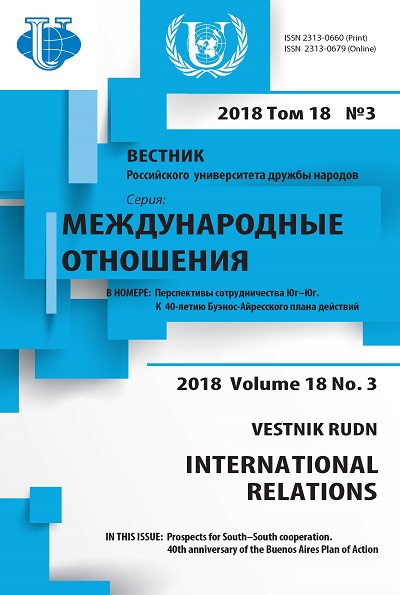ON THE ROLE OF EXTERNAL FACTORS IN THE EMERGENCE OF LEFT IDEOLOGIES AMONG BENGALI ELITE
- Authors: Volgina E.V.1
-
Affiliations:
- Ministry of Foreign Affairs of the Russian Federation
- Issue: Vol 18, No 3 (2018): Prospects for South—South Cooperation. 40th Anniversary of the Buenos Aires Plan of Action
- Pages: 686-700
- Section: POLITICAL PORTRAITS
- URL: https://journals.rudn.ru/international-relations/article/view/20112
- DOI: https://doi.org/10.22363/2313-0660-2018-18-3-686-700
- ID: 20112
Cite item
Full Text
Abstract
This article is an attempt to explore the emergence and expansion of left ideas in Bengal, the key province of colonial India. Nowadays the major part of the province is a part of the West Bengal state, headed by communists for decades. A communist state in a capitalist country is a phenomenon, which cannot be explained merely by economic reasons. A closer scrutiny reveals a certain correlation between the travels to the West by prominent Bengali public figures and leftist thoughts in their works between the late 19th and early 20th centuries. Therefore, their travel narratives, or travelogues, which present the West as the epicenter of rapid economic, scientific and technological development, causing, however, an observable spiritual degradation of society attracts a special attention. None of the travelers introduces him/herself as a consistent socialist or communist, but the Western model comes under severe criticism, though the importance of technical development for India is commonly recognized. This results in the positioning the Soviet system as an alternative to the European and American ways, as a model that is closer and more attractive for India.
Keywords
About the authors
Elena Vasilievna Volgina
Ministry of Foreign Affairs of the Russian Federation
Author for correspondence.
Email: ele-volgi@yandex.ru
Third Secretary of the Ministry of Foreign Affairs of the Russian Federation, Russian Federation
References
- Biswas, A.K. (1986). Vivekananda and the Indian Quest for Socialism. Calcutta: Firma KLM Pvt. Ltd.
- Bose, S.C. (1948). The Indian Struggle 1920—1934. In: Netaji’s Life and Writings, Part II. Calcutta: Netaji Publishing Society.
- Carpenter, E. (2004). Civilization: Its Cause and Cure. Whitefish: Kessinger Publishing.
- Chakrabarti, A. & Dhar, A.K. (2008). Development, Capitalism and Socialism: a Marxian Encounter with Rabindranath Tagore’s Ideas on the Cooperative Principle. Rethinking Marxism, 20 (3), 487—499. DOI: https://doi.org/10.1080/08935690802137787.
- Chattopadhyay, P. (2013) West Bengal: Understanding Trinamul Congress. Mainstream, LI (31). URL: https://mainstreamweekly.net/article4333.html (accessed 09.08.2017).
- The Complete Works of Swami Vivekananda. (1963). Vol. 6. Chennai. URL: http://www.ramakrishna vivekananda.info/vivekananda/volume_6/epistles_second_series/112_mary.htm (accessed 05.10.2017).
- Dange, Sh. A. (1975). From Primitive Communism to Slavery. Moscow: Nauka. (in Russian).
- Dhar, S.N. (1976). A Comprehensive Biography of Swami Vivekananda. Madras: Vivekananda Prakashan Kendra.
- The English Works of Raja Rammohan Roy. (1959). Calcutta: Printed by R.C. Ghosh at the Bengal press.
- Flora, G. (2008). Tagore and Italy: Facing History and Politics. University of Toronto Quarterly, 77 (4), 1025—1057. doi: 10.3138/utq.77.4.1025.
- Gordon, L. (2008). Brothers Against the Raj. New Delhi: Rupa& Co. Hobsbawm, E.J. (2001). Problems of Communist History. London.
- Kalandarova, M.S. (2011). Rabindranath Tagore in the Soviet Union. Asia and Africa today, 3, 51—55. (in Russian).
- Keshub Chunder Sen in England (1881). Calcutta: Brahmo Tract Society.
- Kim, M. & Schoenhals, M. (2013). Mass Dictatorship and Modernity. London: Palgrave Macmillan.
- Mandal, S. (ed.). (2015). A Bengali Lady in England by Krishnabhabini Das. Cambridge ScholarsPublishing.
- Marx, K. (1974). Economic & Philosophic Manuscripts of 1844. In: K. Marx & F. Engels. Collected works. Moscow: Izdatel’stvo politicheskoi literatury, 42, p. 41—174. (in Russian).
- Nemova, A. (2014). “Red chiefs” in “Golden Bengal”. In: Under the Skies of South Asia. Portrait and Sculpture: Territories, Ideologies, and Ethnicities as Viewed through Material Objects. Gen. ed. I.P. Glushkova, ed. by I.T. Prokof’eva. Moscow: Nauka, 109—123. (in Russian).
- Pecherskaya, T.I. (Ed.). (2015). The Russian Travelogue of the XVIII—XX Centuries. Novosibirsk: Publishing sector of NSPU. (in Russian).
- Prasad, B.S.C. (1979). The Socio-Political Philosophy of Swami Vivekananda. Ranchi University.
- Rao, V.K.V.R. (1982). Indian Socialism: Retrospect and Prospect. New Delhi: Concept Publishing.
- Samaddar, R. (2011). Eternal Bengal. Scienza&Politica, 45, 63—79.
- Sehanavis, C. (2013). Brahmo Samaj and Toiling People. Mainstream, LI (51). URL: http://www.mainstreamweekly.net/article4631.html (accessed 23.12.2017).
- Sen K.C. (1894). Diary in England. Bidhan Press.
- Sharma, U. & Sharma, S.K. (2001). Indian Political Thought. Boston, MA: Atlantic Publishers & Dist.
- Sil, N.P. (1997). Swami Vivekananda: A Reassessment. Selinsgrove, PA: Susquehanna University Press.
- Sinha, A. (2005). The Regional Roots of Developmental Politics in India: A Divided Leviathan. Bloomington: Indiana University Press.
- Swami Nikhilananda. (1989). Swami Vivekananda — A Biography. New York. URL: http://www.ramakrishnavivekananda.info/vivekananda_biography/vivekananda_biography.htm (accessed 08.01.2017).
- Swami Vivekananda (2015). Lectures. Vol. 3. Jazzybee Verlag.
- Swami Vivekananda (2016). Vivekananda Reader. Kolkata: Advaita Ashrama. URL: http://bit.ly/ 2g8ValC (accessed 24.08.2017).
- Tagore R. (1965). Letters from Russia. In: Collected works, 12. Moscow: Khudozhestvennaia literatura, 235—293. (in Russian).
- Yurlov, F.N. & Yurlova, E.S. (2010). History of India. XX century. Moscow: IES of RAS. (in Russian).
- The English Works of Raja Rammohan Roy. Calcutta: Printed by R.C. Ghosh at the Bengal press, 1959
- রবী নাথ ঠাকু র| য়ুেরাপবাসীর প | শাি িনেকতন: িব ভারতী, ১৩৯৩| [Tagore R. Letters of a Sojourner in Europe. Santiniketan: Visva Bharati, 1986]
- রবী নাথ ঠাকু র| রািশয়ার িচ ঠ| কিলকাতা: িব ভারতী, ১৪১১ [Tagore R. Letters from Russia. Kolkata: Visva Bharati, 2004]
- মীিবেবকান|পির াজক| ১৩১২. [Swami Vivekananda. Memoirs of European Travel, 1905]. URL: http://www.ramakrishnavivekananda.info/vivekananda/volume_7/translation_of_writings/ translation_of_writings_contents.htm (accessed 08.01.2017).
- মীিবেবকান| ব'2মানভারত|কিলকাতা, ১৩১২. [Swami Vivekananda. Modern India. Kolkata, 1905].
Supplementary files










